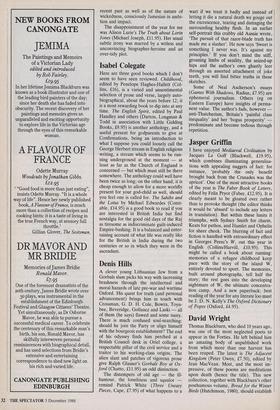Denis Hills
A clever young Lithuanian Jew from a Gorbals slum picks his way with increasing brashness through the intellectual and moral hazards of late pre-war and wartime Oxford. His quest for truth (and personal advancement) brings him in touch with Crossman, G. D. H. Cole, Bowra, Toyn- bee, Beveridge, Gollancz and Laski — all of them (he says) flawed and some nasty. There is much confused soul-searching: should he join the Party or align himself with the bourgeois establishment? The end of his odyssey finds him perched at a British Council desk in Oriel college, a respectable pillar of the civil service and a traitor to his working-class origins. The alien slant and patches of vigorous prose give Ralph Glasser's Gorbals Boy at Ox- ford (Chatto, £11.95) an odd distinction.
The distempers of old age — the ill- humour, the loneliness and squalor — remind Patrick White (Three Uneasy Pieces, Cape, £7.95) of what happens to a wart if we treat it badly and instead of letting it die a natural death we gouge out the excrescence, tearing and damaging the surrounding healthy flesh. In an earlier self-portrait this crabby old Aussie wrote, 'The pursuit of that razor-blade truth has made me a slasher'. He now says 'Sweet is something I never was. It's against my principles.' If you don't mind the stiff, groaning limbs of senility, the seized-up hips and the author's own ghastly leer through an assorted attachment of joke teeth, you will find bitter truths in these sketches.
Some of Neal Ascherson's essays (Games With Shadows, Radius, £7.95) are ephemeral journalism. Others (eg on Eastern Europe) have insights of perma- nent value. The author's fads, however — anti-Thatcherism, Britain's 'painful class inequality' iind her 'bogus prosperity' — predominate and become tedious through repetition.


































































 Previous page
Previous page